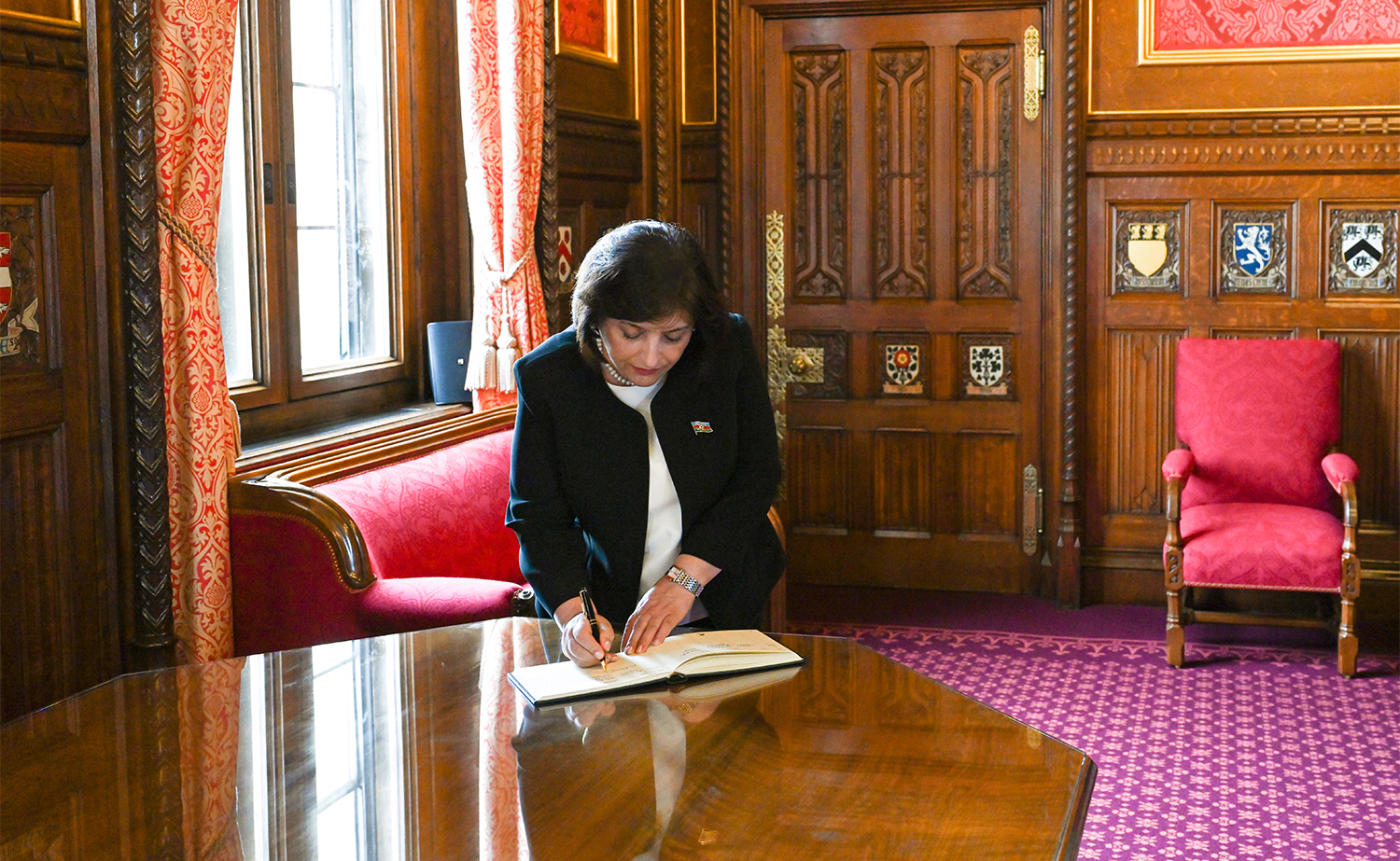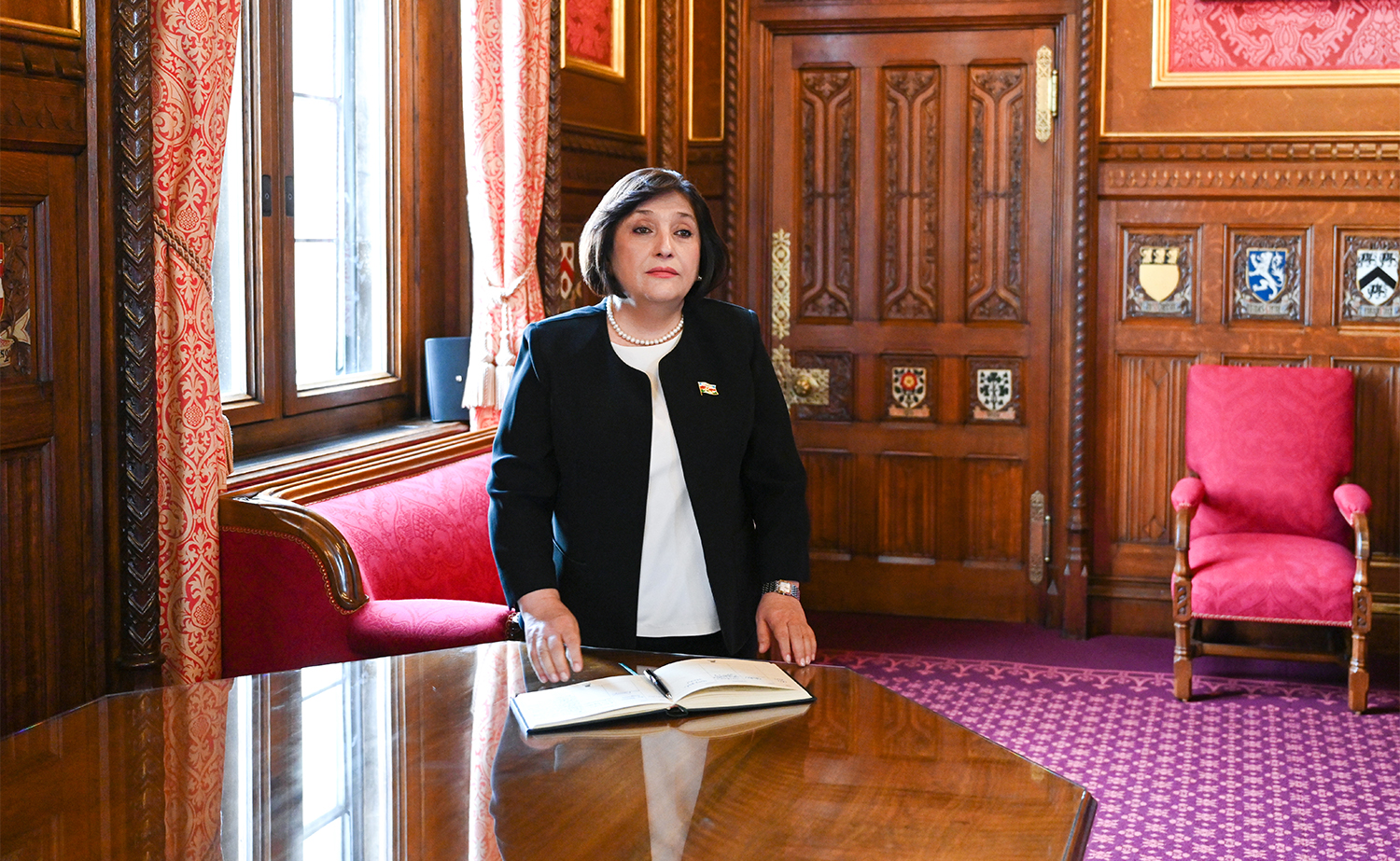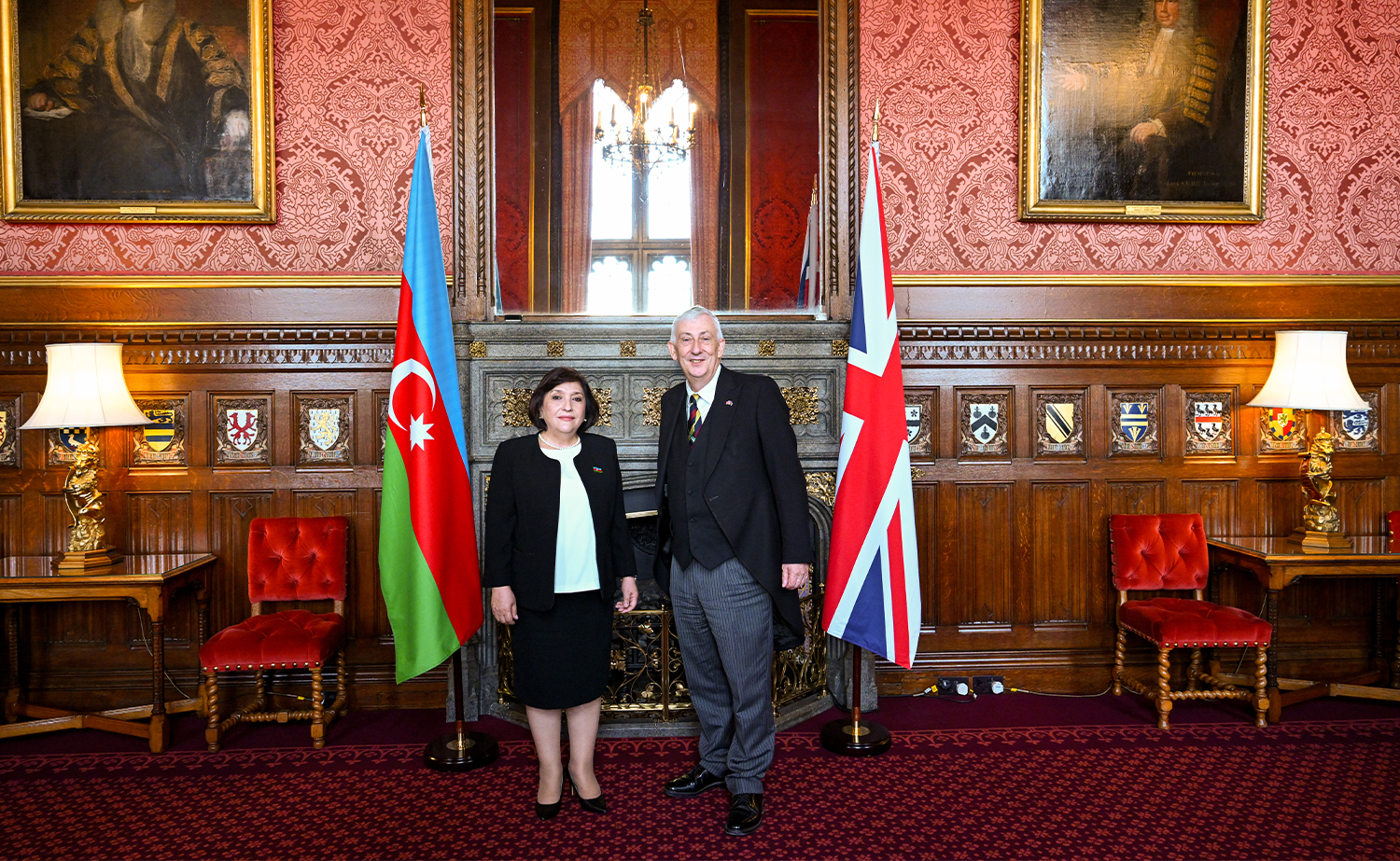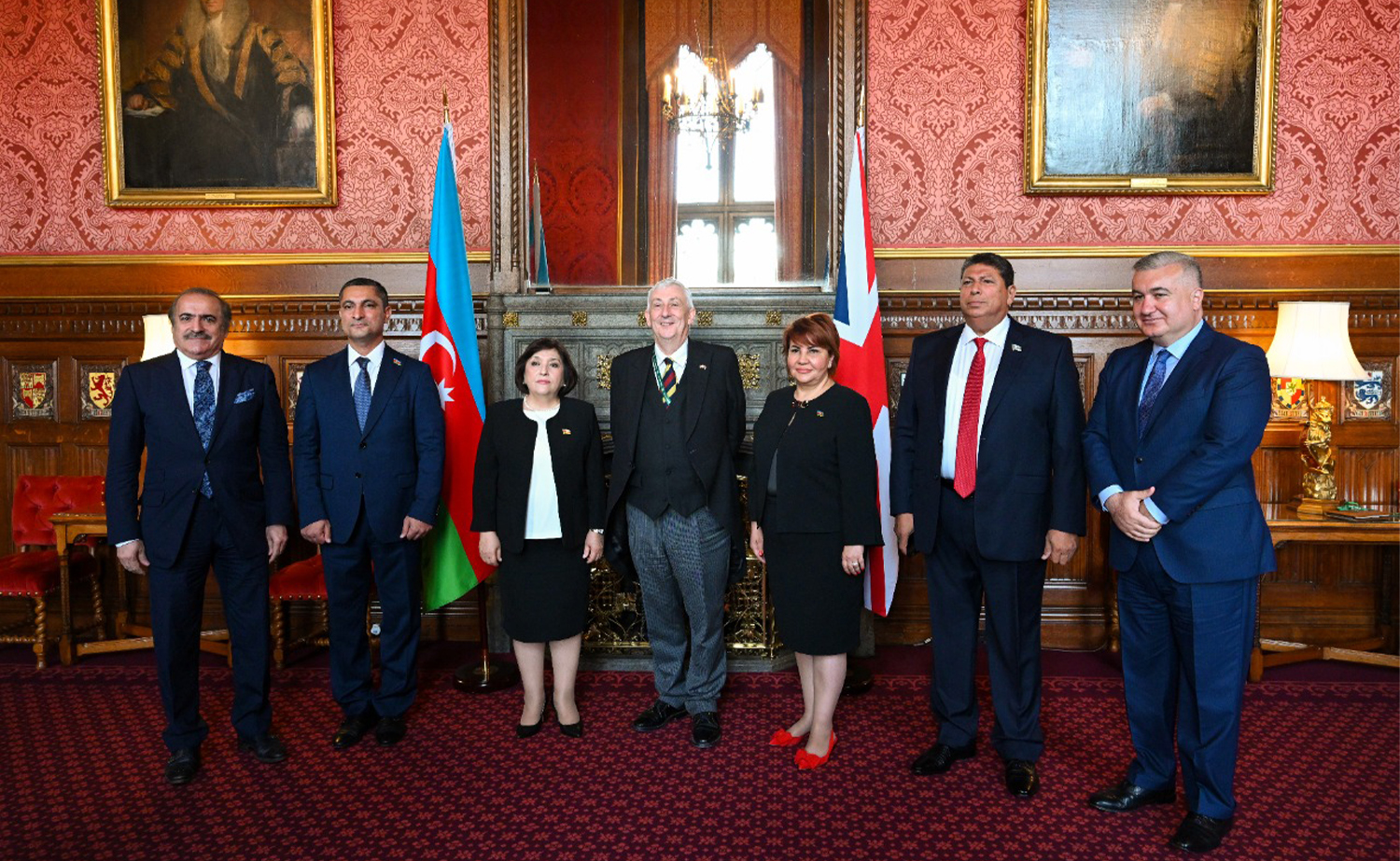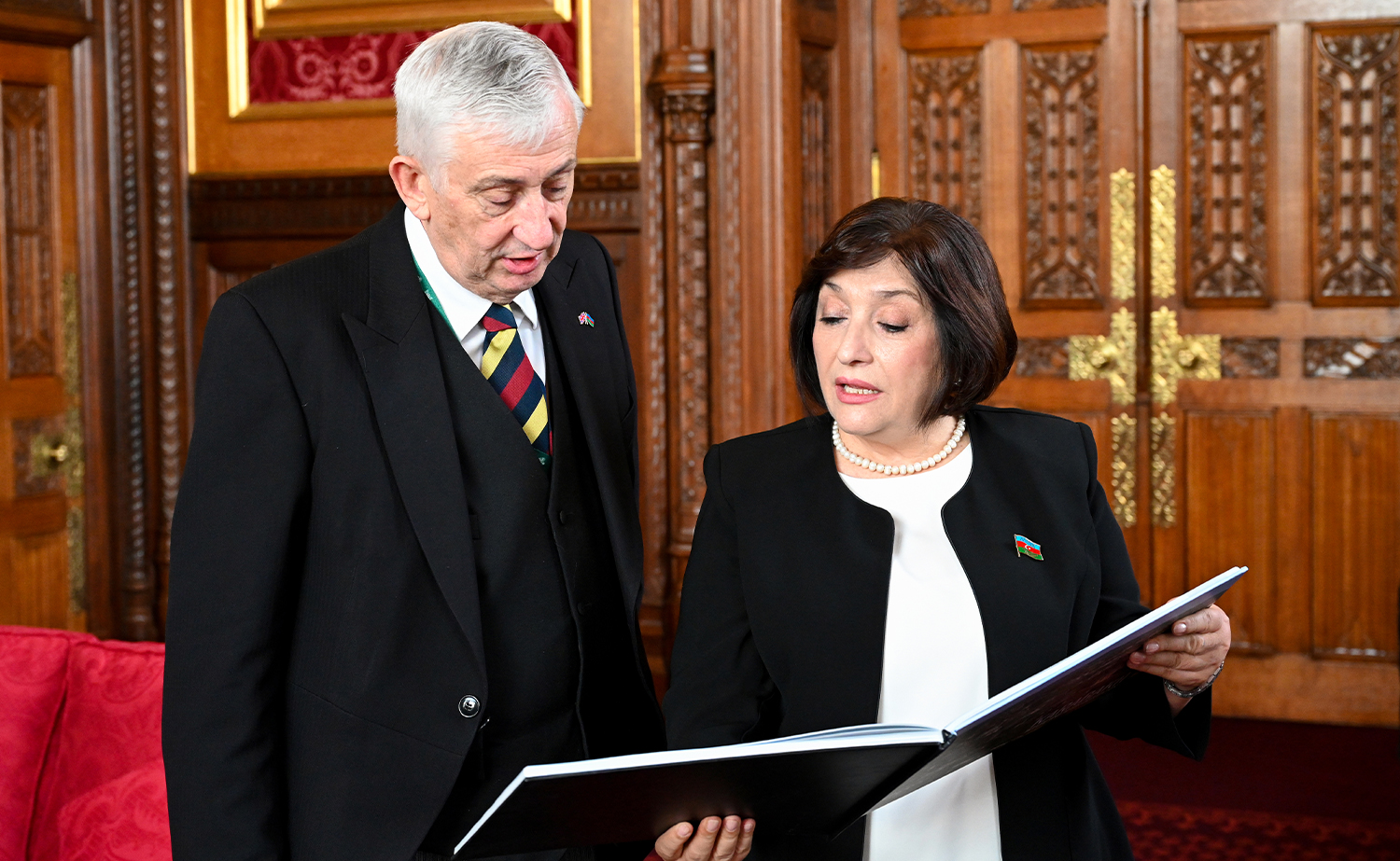Chair of Milli Majlis Sahiba Gafarova Meets Speaker of the House of Commons on Her Official Visit to United Kingdom

Chair of the Milli Majlis Sahiba Gafarova had a conversation with Speaker of the House of Commons of the British Parliament Sir Lindsay Hoyle on 12 July as part of her current official visit to the United Kingdom.
The flag of our country was hoisted in front of the Houses of Parliament in honour of the arrival of the leader of the Azerbaijani parliament.
Welcoming the Chair of the Milli Majlis, the Speaker of the House of Commons mentioned the great weight the UK attached to the arrival of the leader of the Azerbaijani parliament. The bilateral diplomatic relations that have turned thirty years have seen a successful co-operation arranged with success, according to Sir Lindsay who spoke of Great Britain’s interest in making the relations deeper. It is important that the co-operation between our legislatures should continue progressing, in his opinion.
Thanking for the generous hospitality extended to the Azerbaijani parliamentary delegation, Sahiba Gafarova told Sir Lindsay that that was her first arrival in the UK as Chair of the Milli Majlis, saying then that she believed the visit would serve to strengthen and broaden our inter-state and inter-parliamentary connexions further.
Our friendly states are also partners whose political, economic, humanitarian and other interaction has been progressing dynamically these past thirty years since the diplomatic relations were established. Reciprocal high-status visits and negotiations conducted during them have played an exceptional role in that, in which relation Mrs Gafarova mentioned the visits of President Ilham Aliyev of Azerbaijan to Great Britain: she described them as a token of the prominent level of our political relations.
The economic ties constitute the main component of the relations; besides, the UK is the chief trade partner of Azerbaijan; there are almost 600 British companies registered in Azerbaijan, which spells well inasmuch as the diversification of our economic interaction is concerned, Mrs Gafarova continued. She also referred the high-level interaction in the energy industry and mentioned in this regard BP as a dependable crude oil and gas upstream partner of our country. Azerbaijan also always felt the British backing whilst implementing the South Gas Corridor project; besides, there is the evidently active co-operation in the field of renewable energy.
The history of the Azerbaijani parliamentarism is traceable back to the Azerbaijan Democratic Republic that came forth at the beginning of last century and to her legislature that was established in 1918. That was the first parliamentary republic in the Muslim East. In the same year 1918 and before the majority of the Western countries, Azerbaijan had given suffrage to women and had ensured parliamentary representation of all her ethnic groups.
What else Sahiba Gafarova said was that inter-parliamentary connexions made the essential component of bilateral and multilateral inter-state relations, adding that our friendly ties were based on mutual respect and that the Azerbaijani parliament had every intention of making those ties stronger. The parliamentary co-operation is contributing to the advancement of the Azerbaijani-British relations; the friendship groups of both legislative assemblies are most commendably in action. The periodical meetings, the dialogue and the exchange of opinions as well as the contacts between those friendship groups could function as a bridge between our parliaments, according to Mrs Gafarova. As regards the parliamentary committees of both sides, the inter-parliamentary interaction could be made more profound by their virtue – and positive results would not be slow in coming then. Also, the committees could be exchanging legislative experience in legal, economic, humanitarian and other fields.
As she was telling the Speaker of the Commons about the current state of affairs in the South Caucasus and of the prospects of a peace between Armenia and Azerbaijan, Sahiba Gafarova pointed out that Azerbaijan had ended the Armenian aggression and had made its national territory whole again by gaining the upper hand in the Patriotic War of 2020. Azerbaijan had independently enforced the resolutions of the UN Security Council and the other international law documents. As for today, well, there is no conflict between Armenia and Azerbaijan anymore – the lapsed confrontation is a thing of history annals now.
During the years of occupation, Armenia had premeditatedly destroyed all the towns and villages of Azerbaijan, vandalised our cultural and historical heritage and desecrated shrines and temples. So, now Azerbaijan is occupied with the wide-scope restoration and refurbishment of those territories with reliance on her own resources and devices only. New towns and villages are being laid in Garabagh and East Zangazur declared the ‘green energy’ zone. The former IDP will start returning to their homes already this year. Sadly, though, the intensive Armenian mining of the once-captured Azerbaijani territories is the chief hurdle to all those efforts and projections. More than 210 civilians and military have either died or been injured by mine explosions since 10 November 2020. While Azerbaijan is one of the most mine-contaminated countries in the world, it is also amongst those in receipt of the least international humanitarian demining aid. Having said that, the Chair of the Milli Majlis emphasised the British companies’ contribution to the demining in the liberated Azerbaijani territories and to their restoration and rehabilitation.
Sahiba Gafarova stressed that new realia and opportunities had come to light in the South Caucasus in the post-conflict period and that tapping those opportunities would strengthen peace, security and co-operation in our region. The North-South and East-West transport corridors cross Azerbaijan, which has made hefty allocations towards the costs of development of transport infrastructure. The start of the Zangazur Corridor and the restoration of all the regional communications will increase the transport potential of this corner of the world substantially. Besides, whilst promoting progress and stability in the region, they would also be useful to Armenia which exists under a blockade as it is.
Other matters of shared interest were discussed during the conversation as well.
The Press and Public Relations Department
The Milli Majlis




